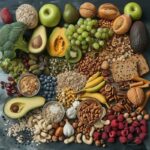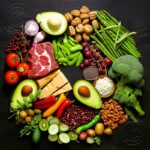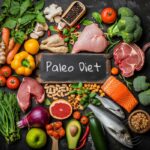Understanding the Keto Diet
The ketogenic diet, popularly known as the keto diet, is a unique approach to eating that emphasizes a drastic reduction in carbohydrates and a significant increase in fats.
This composition shifts the body into a metabolic state called ketosis.
During ketosis, the body becomes incredibly efficient at burning fat for energy, a process that also turns fat into ketones in the liver, supplying energy for the brain.
The traditional breakdown of the keto diet typically involves around 70-80% fat, 10-20% protein, and 5-10% carbohydrates.
This ratio can vary based on individual needs and goals.
The reduction in carbs puts the body into a metabolic state different from the glucose-based metabolism that most people are accustomed to.
This state can lead to a range of health benefits and physiological changes.
Keto Diet for Beginners: Essential Tips
Starting a keto diet requires a thoughtful approach to restructure your eating habits.
Here’s how you can begin:
- Educate Yourself: Understand the basics of the diet, including what ketosis is and how it affects your body.
- Plan Your Transition: Gradually reduce carbohydrate intake over a few days to a week. This can help minimize symptoms of the keto flu.
- Set Realistic Goals: Whether it’s weight loss, improved energy, or better health, set clear, achievable goals.
- Consult a Professional: Especially important if you have existing health conditions like diabetes or high cholesterol.
- Prepare for Dietary Changes: This includes meal planning, grocery shopping, and preparing your kitchen.
Discover the transformative power of a vegan lifestyle! Embracing a diet that excludes all animal products, including meat, dairy, eggs,…
Keto Basics: Carbs, Protein, Fat
In the keto diet, the balance of macronutrients is key:
- Carbohydrates: Limit to 20-50 grams per day. Focus on fiber-rich, low-carb vegetables.
- Protein: Moderate intake is important. Aim for about 0.8 grams per pound of lean body mass.
- Fats: Should form the majority of your intake. Prioritize healthy fats like olive oil, avocados, and nuts.
The Benefits and Challenges
Benefits:
- Weight Loss: By using fat as the primary energy source, the body may lose weight more effectively.
- Blood Sugar Control: Helpful for managing diabetes and insulin sensitivity.
- Mental Clarity and Energy: Many report heightened mental clarity and consistent energy levels.
- Heart Health: Potential improvements in cholesterol and blood pressure.
Challenges:
- Keto Flu: Symptoms include fatigue, headaches, and irritability due to carb withdrawal.
- Social and Dietary Restrictions: Eating out or socializing can be challenging due to dietary restrictions.
- Nutrient Deficiencies: Risk if the diet is not well-planned.
- Long-Term Sustainability: Some find the diet difficult to maintain long-term.
Dive into the world of carbohydrates and ketosis, where weight loss, improved blood sugar control, and reduced risk of heart…
Preparing Meal Plan
Creating a balanced keto meal plan involves a mix of planning and creativity:
- Breakfast: Options like eggs, avocado, and spinach omelets.
- Lunch and Dinner: Focus on high-fat, moderate-protein dishes like grilled salmon with asparagus or zucchini noodles with pesto and chicken.
- Snacks: Include nuts, cheese, or Greek yogurt to keep hunger at bay.
Grocery Shopping
A well-planned grocery list is essential for sticking to the keto diet.
Here are some staples:
- Vegetables: Opt for low-carb options like leafy greens, broccoli, cauliflower, and zucchini.
- Proteins: Eggs, fatty fish like salmon, chicken, beef, and tofu for plant-based diets.
- Dairy: Cheese, butter, and full-fat yogurt.
- Nuts and Seeds: Almonds, walnuts, flaxseeds, and chia seeds.
- Fats and Oils: Olive oil, coconut oil, and avocado oil.
- Others: Herbs, spices, and condiments with no added sugars.
Remember, each person’s body responds differently to dietary changes.
Monitoring your body’s reaction and adjusting your diet plan accordingly is crucial for a successful keto journey.
Discover the key to a successful keto journey with our comprehensive guide on Keto Diet Micronutrients. Learn about the crucial…
Avoiding Common Pitfalls
Navigating the keto diet can be challenging, especially for beginners.
Awareness and strategic planning can help you avoid common pitfalls:
- Inadequate Hydration and Electrolyte Balance: Keto can lead to increased water loss. Ensure you drink plenty of water and maintain electrolyte balance.
- Ignoring Vegetables: While focusing on fats and proteins, don’t neglect low-carb vegetables. They are crucial for fiber and nutrients.
- Overconsumption of Fats: While fats are central to keto, excessive intake can lead to other health issues. Balance is key.
- Neglecting Protein: Moderate protein is essential for muscle maintenance and overall health.
- Falling for ‘Keto-Approved’ Products: Be wary of processed foods marketed as keto-friendly. Focus on whole, unprocessed foods.
Managing Keto Flu and Side Effects
The initial transition to keto can bring about the ‘keto flu’, a term used to describe flu-like symptoms that occur as the body adapts.
Here’s how to manage it:
- Stay Hydrated: Drink plenty of water to combat fatigue and headaches.
- Electrolytes: Supplement with sodium, potassium, and magnesium.
- Eat Enough Fat and Calories: Ensure you’re consuming enough energy sources.
- Rest and Relaxation: Give your body time to adjust without added stress.
Balancing Keto with Exercise
Exercise is an important aspect of overall health and can complement your keto journey:
- Start Slow: If new to keto, give your body time to adjust before introducing intense exercise.
- Focus on Low-Intensity Workouts: Activities like walking, cycling, or yoga can be more suitable when starting out.
- Listen to Your Body: Pay attention to how your body feels and adjust your activity level accordingly.
- Fuel Appropriately: Ensure your body has enough fuel for exercise, considering the reduced carb intake.
Concluding Thoughts on Starting Keto
As you embark on your keto journey, remember it’s a personal experience unique to each individual.
Tailor the diet to fit your lifestyle, preferences, and health needs.
Regular monitoring and adjustments are key to finding what works best for you.
Whether it’s for weight loss, health improvement, or both, the keto diet can be a transformative journey with the right approach and mindset.







